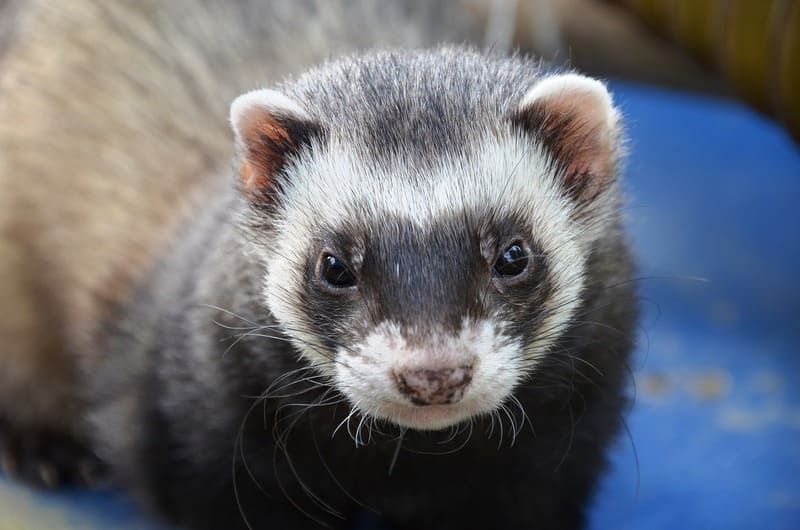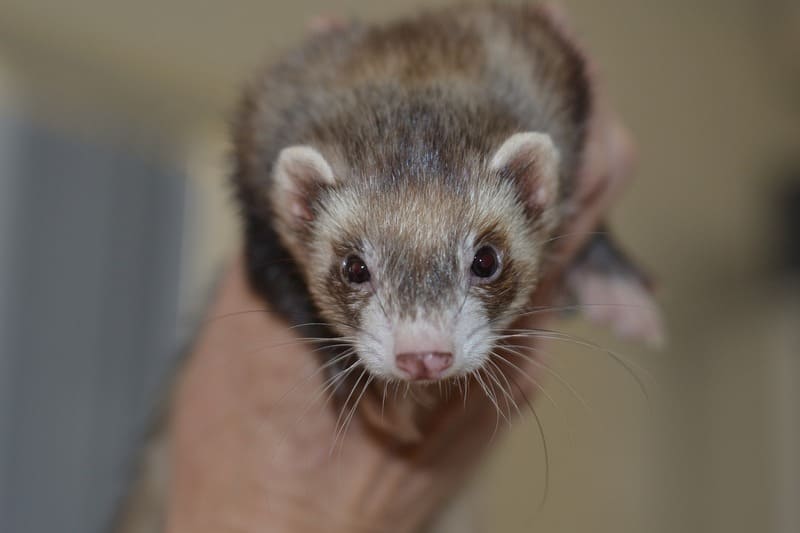Ferrets, with their curious and playful nature, can make wonderful additions to a family, but what about ferrets and children? Understanding how these two can coexist safely and harmoniously is essential for the well-being of both your ferrets and your children. In this comprehensive guide, we’ll explore the dynamics of introducing ferrets to children, teaching kids to interact with ferrets responsibly, potential challenges, and the many benefits of this unique relationship.

Ferrets as Family Pets
Ferrets are domesticated animals that have been kept as pets for centuries. They are known for their energetic and social personalities, making them excellent companions for families. However, before introducing ferrets to children, it’s essential to understand their characteristics, needs, and behaviors.
Ferret Characteristics
- Curiosity: Ferrets are incredibly curious animals, and they love to explore and investigate their surroundings. This natural curiosity can be an entertaining and endearing trait for children.
- Playfulness: Ferrets are playful creatures, and their playful antics can provide hours of entertainment for both children and adults. They enjoy games of hide-and-seek, chasing toys, and wrestling.
- Affection: Ferrets are social animals that often form strong bonds with their human family members. They enjoy being held and cuddled, and they may even fall asleep in the arms of their caregivers.
- Intelligence: Ferrets are intelligent animals that can be trained to respond to their names, use a litter box, and even perform tricks. Involving children in the training process can be a fun and educational experience.
Ferret Needs
- Exercise: Ferrets are highly active animals and require plenty of exercise. Providing them with ample playtime and opportunities to explore can help keep them happy and healthy.
- Social Interaction: Ferrets thrive on social interaction and can become lonely and depressed if left alone for extended periods. They benefit from spending time with their human family and other ferret companions.
- Proper Diet: Ferrets are obligate carnivores, which means their diet should consist primarily of high-quality meat-based foods. Educating children about the importance of feeding the right diet to their ferrets is essential.
- Grooming: Ferrets have dense fur, and regular grooming is necessary to prevent matting and hairballs. Involving children in the grooming routine can be a valuable lesson in responsible pet care.

Introducing Ferrets to Children
Before introducing ferrets to children, there are several essential steps to consider. This initial process can set the stage for a safe and positive relationship between your ferrets and your kids.
Education
Teaching children about ferrets is the first and most crucial step. Explain the nature and needs of ferrets, emphasizing their sensitivity and the importance of gentle handling. Use age-appropriate language and visuals to help children understand.
Supervision
Supervision is paramount when children interact with ferrets, especially at the beginning. Ensure that an adult is present during all interactions to guide and intervene as needed.
Age-Appropriate Tasks
Assign age-appropriate tasks to children that align with their capabilities and understanding. Younger children can assist with feeding, grooming, and providing companionship, while older children may take on more significant responsibilities, such as cleaning the enclosure or supervising playtime.
Gentle Handling
Teach children the proper way to handle ferrets. Emphasize the need for gentleness and calmness. Encourage children to use soft voices and avoid sudden movements that might startle the ferrets.
Respect for Boundaries
Ferrets, like any animals, need their space and moments of rest. Teach children to recognize when the ferrets need some alone time and not to disturb them during these moments.
Hygiene
Discuss the importance of handwashing before and after handling ferrets to prevent the spread of germs and zoonotic diseases. Make it a routine and a habit.
Sharing Responsibilities
Incorporate ferret care into the family routine. Assign different tasks and responsibilities to children, so they understand the commitment required to care for their ferret companions.

Teaching Responsibility and Empathy
Caring for ferrets can be an educational and character-building experience for children. It provides an opportunity to teach them responsibility, empathy, and important life skills. Here are some valuable lessons children can learn from caring for ferrets:
Responsibility
- Feeding and Nutrition: Children can learn about the nutritional needs of ferrets and the importance of providing them with a balanced diet.
- Grooming: Regular grooming helps children understand the significance of hygiene and proper pet care.
- Cleanliness: Keeping the ferret’s enclosure and litter box clean instills the importance of cleanliness and a tidy living environment.
- Healthcare: Routine veterinary visits for vaccinations and check-ups teach children the importance of regular healthcare for pets.
Empathy
- Sensitivity: Interacting with ferrets can help children develop sensitivity and an understanding of animals’ feelings.
- Compassion: Learning to care for and comfort ferrets when they are sick or injured fosters compassion and empathy.
- Non-Verbal Communication: Understanding ferret body language and behavior can teach children to empathize with animals and respond to their needs.
- Respect for Life: Caring for living beings like ferrets can instill a deep respect for all life forms.
Challenges and Solutions
While ferrets and children can form beautiful relationships, it’s important to acknowledge and address potential challenges that may arise.
Biting
Ferrets have sharp teeth, and children may sometimes experience nips or bites during play. Teach children to recognize the signs of overstimulation in ferrets and how to avoid situations that can lead to biting. Emphasize gentle handling and avoid rough play.
Allergies
Some children may be allergic to ferret dander. If allergies are a concern, consider having an allergist test your child before bringing a ferret into the family. Frequent cleaning and maintaining a clean living environment can also help reduce allergen exposure.
Hygiene and Safety
Ferrets can carry salmonella, a bacteria that can cause food poisoning. Teach children to wash their hands thoroughly after handling ferrets or cleaning their enclosure to prevent the spread of disease.
Sharing Responsibilities
Make sure that children understand the long-term commitment of caring for ferrets. When assigning responsibilities, ensure that they are age-appropriate and manageable for children. This helps avoid frustration and neglect of the ferrets’ needs.
Benefits of Ferrets for Children
Introducing ferrets to children can bring numerous benefits, enriching their lives and teaching valuable life lessons. Some of the advantages include:
Companionship
Ferrets can provide children with constant companionship and unconditional love. The bond between a child and their ferret can be deep and meaningful.
Responsibility
Caring for ferrets teaches children responsibility, commitment, and time management. They learn to prioritize the needs of their pets.
Empathy
Interacting with ferrets helps children develop empathy and compassion. They learn to understand and respond to the feelings and needs of their animal companions.
Learning Opportunities
Caring for ferrets provides numerous learning opportunities. Children can learn about biology, animal behavior, nutrition, and hygiene.
Social Skills
Ferrets can help children develop social skills as they interact with other ferret owners, veterinarians, and pet store employees.
Stress Relief
Playing and cuddling with ferrets can be a stress-relieving and calming experience for children, particularly those dealing with anxiety or emotional challenges.
Lifelong Bond
Many children who grow up with ferrets form lifelong bonds with these animals and continue to care for ferrets well into adulthood.
Conclusion
Ferrets and children can coexist in a loving and enriching relationship, provided that the introduction is carefully managed, and children are taught how to interact with ferrets responsibly. This unique bond can offer children a host of benefits, including companionship, responsibility, empathy, and numerous learning opportunities.
In the end, the key to a successful coexistence between ferrets and children lies in open communication, understanding, and proper supervision. With the right guidance, children can form loving and lasting bonds with their ferret companions while learning essential life skills and values that will benefit them throughout their lives.
